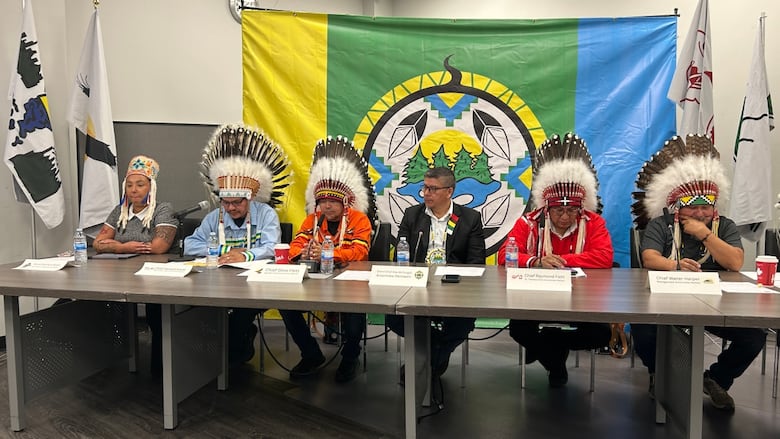Investment in First Nations wildfire prevention needed to halt 'cycle of failure': Island Lake chiefs
'We are not burning because of fate, we are burning because budgets refuse to bend': grand chief

Four First Nations in Manitoba are calling on the federal and provincial governments to overhaul their emergency response systems to prioritize wildfire prevention, as Island Lake communities remain under states of emergency and mandatory evacuation orders.
At a Friday press conference in Winnipeg, Anisininew Okimawin Grand Chief Alex McDougall said the First Nations his tribal council represents — Garden Hill Anisininew Nation, Red Sucker Lake Anisininew Nation, St. Theresa Point Anisininew Nation and Wasagamack Anisininew Nation — are located in remote and fire-prone areas, but lack the infrastructure needed to prevent wildfires.
"This is not an emergency system, this is a cycle of failure. Our chiefs in Anisininew nations are saying to Canada, 'the cycle ends now,'" McDougall said.
An out-of-control wildfire near Garden Hill has burned more than 37,800 hectares, the province's most recent fire status report showed on Friday.
A 2022 independent report from Canada's auditor general found that Indigenous Services Canada did not provide First Nations with the support needed to manage wildfires, focusing on reacting as opposed to preventing emergencies.
The department spent about 3.5 times more on wildfire response and recovery compared to prevention between 2009 and 2022, according to the report.
"That's unacceptable. It should be the other way around," said Willie Moore, the Manitoba regional chief for the Assembly of First Nations. The assembly is lobbying all levels of government to spend more on preventing wildfires in First Nations communities, he said.

Leaders issued five calls to action to the federal and provincial governments on Friday:
- Prioritize prevention by investing in community-led fire breaks and suppression teams.
- Immediately approve and fund infrastructure projects that improve wildfire resilience.
- Build an Island Lake road to reduce reliance on airlifts during evacuations in the four remote fly-in communities, located roughly 500 kilometres northeast of Winnipeg.
- Develop a national Indigenous fire strategy.
- Respect Anisininew leadership.
Garden Hill, St. Theresa Point and Wasagamack have each been evacuated twice this year, in separate evacuation orders issued in June and July.
The fire has surrounded Garden Hill, located on a triangular peninsula on Island Lake.
All 4,000 community members were ordered to evacuate on July 9, while St. Theresa Point and Wasagamack have evacuated Priority 1 residents (those deemed most at risk).
Proper resources could prevent evacuations: chief
Garden Hill Chief Dino Flett said evacuees are scattered across Manitoba towns and cities, with about 100 community members still waiting at Winnipeg congregate shelters for hotel rooms to become available.
He said the evacuation would never have happened if First Nations had the resources they needed to fight the fires, like fully trained local firefighters and fire suppression equipment.

"In our community, we don't have any trained firefighters for this. That's what we're asking for as well. We need fire suppression for our communities, our region, so we can do these things for ourselves," Flett said.
"This could have all been prevented."
Provincial Natural Resources Minister Ian Bushie says the province is committed to keeping Island Lake residents safe.
The Manitoba Wildfire Service has expanded emergency firefighter training directly into communities, including the Island Lakes region," Bushie said in a statement emailed to CBC on Friday.
His department agrees that wildfire response requires more collaboration between First Nations leaders, the province and the federal government, the statement said.

The Island Lake chiefs also said investing in infrastructure like a road through the fly-in communities would ensure residents aren't trapped, with an airlift as their only way out, in the event of wildfires.
"Canada spends more flying us out of danger than building the roads and firebreaks that would protect us. This is not mismanagement, this is discrimination," said Red Sucker Lake Anisininew Nation Chief Sam Knott, whose First Nation flew out about 300 Priority 1 evacuees.
Grand Chief McDougall said the cost "pales with the human and financial cost of evacuations and isolation."
Federal Northern and Arctic Affairs Minister Rebecca Chartrand says all-weather road access in Island Lake First Nations is a priority for her government.
"Year-round access saves lives, supports economic development, and reduces the risks and impacts of evacuations," she said in a statement emailed to CBC.
The Canadian Red Cross said it has registered more than 31,000 evacuees across Manitoba over the course of this wildfire season, including 7,000 registered on behalf of Indigenous Services Canada as of Wednesday.
A spokesperson for Indigenous Services Canada told CBC News the agency provides funding and programming to help First Nations with emergency management and preparedness, including the FireSmart program, which offers firefighter training and prevention resources.
Indigenous Services Canada is engaging with First Nations and the provincial government "to discuss improvements based on lessons learned from the current wildfire season," the spokesperson said.
On Friday, McDougall urged all levels of government to act immediately.
"We are not burning because of fate, we are burning because budgets refuse to bend," McDougall said.
"Let's choose investment over neglect."
Find the latest wildfire information at these sources:
- Canadian wildfire map
- Province of Manitoba fire bulletins
- CBC's wildfire tracker
- Communities under evacuations in Manitoba
Are you an evacuee who needs assistance? Contact Manitoba 211 by calling 211 from anywhere in Manitoba or email 211mb@findhelp.ca.
With files from Gavin Axelrod


